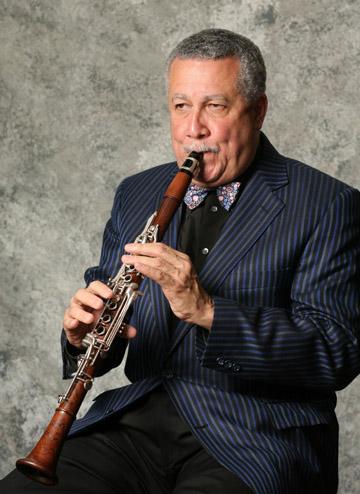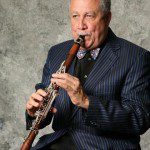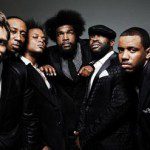Paquito D’Rivera’s ‘Sax Life’ Perfect for Jazz
By • September 12, 2013 0 1778

When we think about the 2013 D.C. Jazz Festival, we can think about a lot of things—the essence and variety of jazz, the boundless talents of the performers, the vision of festival founder Charles Fishman, the way the festival has grown in size and venues.
All of that is well and good, but there’s been another constant through the history of this festival which is critical, and that’s the presence of Paquito D’Rivera in his role as co-artistic director, idea man, iconic figure of Latin jazz and performer.
In some form or another, he’s always there: we remember him from the New Orleans-themed festival several years ago in which he headlined a concert but managed to appear to be in several places at once. On a Sunday, with the bluesy, jazzy uniquely New Orleans sound being generated by Buckwheat Zydeco, there was D’Rivera in a shirt of many colors wailing with Zydeco and his group on the sax, blending and adding.
On the phone, he sounds a little bit like he plays—hard-driving, direct, untethered and not a little unfiltered, boisterous, funny, adventuresome. You think of him immediately as a man who’s comfortable with ideas and appetites, all sorts of people and all sorts of music. He is the pied piper and exemplar in some ways of the marriage of forms and genres. He’s an embracer. He’s speaking from New York, but it feels as if he’s in the room with you.
This year the Cuban-born D’Rivera and his PanAmericana Ensemble headline another special feature of the festival in “Jazz Meets the Latin Classics,” which comes after last year’s Jazz Meets the Classics I in a concert at the Kennedy Center Terrace Theater June 14.
“It continues the theme of jazz and classical music, only this time the emphasis is on Latin classical music,” d’Rivera said. “The music will be tackling compositions and works by people like Piazzolla, Lecuona, Rodrigo, Villa Lobos and some of my work.” On hand will be soprano Brenda Feliciano and guitarist Berta Rojas in arrangements and improvisations, along with Alex Brown, Oscar Stagnaro, Yotam Silberstein, Edmar Castañeda, Hector del Curto, Diego Urcola, Michael Philip Mossman, Mark Walker and Pernell Saturnino. Brenda Feliciano is D’Rivera’s wife.
“We explored the classics with jazz musicians and jazz style last year,” D’Rivera said.
“This is a continuation along the same lines but in a Latin vein. I think we’re seeing bridges trying to be built that bring musical forms together, lead to new innovation and the like. A lot of it is coming from the classical end, trying to expand the horizons and audiences. I think on the whole that’s a good thing, the idea of fusion. But, just like in fusion cuisine, you’ve got to be careful of how you go about doing it, otherwise you end up with something like putting together black beans and sushi, which tastes awful.”
“I have to tell you,” he said. “Charlie got this festival done. This is a great city, a city with a jazz history. It’s supposed to be the capital of jazz. It should have a major jazz festival. If not here, where, you know. And Charlie got that done. He’s been a great friend, and so was Dizzy Gillespie, which is how I got here to begin with. But my job here—I think it’s to keep Charlie calm. Seriously, I am so proud of being a part of the festival as much as I have.”
D’Rivera is a multi-tasker, a multi-excellent talent and leader, an innovator. You can see the strains of where his music often goes in his compositions and by the people he plays with and collaborates with, building bridges. He has the stellar, huge reputation that allows him to make major inroads into cross-pollination of musical genres and styles—he has won six Latin Grammy Awards and four Grammy Awards and plays the saxophone, clarinet and soprano sax and flute. He’s won a Gramny for classical music. That may be an influence from his father Tito Rivera, who was a noted classical saxophonist and conductor in Cuba. In a way, D’Rivera’s presence, his association with jazz giants, his own major star status adds to the festival’s luster.
No question, he is also Cuban, through and through. In his colorful autobiography “My Sax Life,” that comes through in anecdotes and pictures and a vibrant, pungent story-telling gift. But you can also tell he’s a serious man, who can improvise with the best of them—he’s a Charlie Parker fan—but insists upon the notion that musicians ought to be able to read music.The book itself is a jazz history of sorts—meeting with men he admired and respected, and probably loved, Gillespie among them. I mentioned that Gillespie used to go to Harold’s Deli in Georgetown for coffee back when he played in town frequently. “Maybe we can have coffee there,” he said. Sadly, Harold’s is no longer around.
He left Cuba in the 1980s and has never returned not even to visit, citing the visa and passport restrictions and a serious lack of love for the Castro regime. “Some people make a hero out of Che Guevera,” D’Rivera said. “Not me.”
He is a jazz man but much more than that. Not by any means is he an elder statesman—he’s in his mid-sixties—but he carries the earned weight of honors, a string of multi-faceted recordings that are mountain-sized. “I’m not crazy about rock and roll,” he said. “The noise, it’s loud. But then you look at the Beatles, those guys they expanded the form.”
That’s what Paquito D’Rivera does with jazz and, one suspects, with life its own self. He expands the form.
Jazz Festival’s Roll Call of Heavy Hitters
With its many venues—especially with the offerings all over town in the Jazz in the ‘Hoods series as well as more high profile venues such as the Jazz at the Hamilton Live series—the 2013 D.C. Jazz Festival, running June 5 through 16, represents a treasure trove of talent on Washington stage.
To paraphrase what people say about theater—with the jazz festival the players are the thing and so we’re presenting a few of the names, the music, the players who are the stars of the festival, including Paquito D’Rivera, the Latin Jazz king who’s also the co-artistic director of the festival.
Player drum roll:
The Roots—If any group exemplifies just how big a shadow jazz casts and how many kinds of music and musicians perform under its big tent, it’s probably the Roots, the Grammy Award-winning hip hop and soul band founded by Tariq “Black Thought” Trotter and Abmir “Questlove” Thompson in 1987 in Philadelphia. Their music is jazzy, and eclectic, and with its wide reach, man
ages to maintain a broad audience, with no small thanks to its role as the house band for the perpetually hip and cool Jimmy Fallon Show.
Although ranked among the top hip hop bands ever, the group with 10 albums under its belt, two EPs and collaborations with many artists. It’s the festival’s signature event, a concert at Kastles Stadium at the Wharf June 15, with doors opening at 3 pm.
Arturo O’Farrill, is a pianist and the son of Latin jazz musician Chico O’Farill who’s performing with his own band, the Afro Latin Jazz Orchestra, in a concert at the Sixth and I Street Synagogue June 9 , being billed as “From Bagels to Bongos.”
Pharoah Sanders—The legendary saxophonist came out of the John Coltrane bands and made himself known for his “overblowing, harmonic, and multiphonic techniques” which were totally new. At the Bohemian Caverns, June 14.
John McLaughlin—The South Yorkshire, England, native who is called Mahavishnu John McLaughlin is a guitarist, bandleader and composer who mixes jazz with rock and Indian music. No less an authority than rock guitarist Jeff Beck has called him “the best guitarist alive.” At the Howard Theater June 16.
Terri Lyne Carrington—Carrington is a multi-talented force as a jazz drummer, composer, producer and entrepreneur who has played with Stan Getz, Dizzy Gillespie, Clark Terry and Herbie Hancock. She’s performing her “Money Jungle: Provocative in Blue” at the Hamilton Live June 8.
The Brubeck Brothers Quartet—The quartet, made of Dave Brubeck sons Chris on bass and trombone and Dan on drums as well as Mike DeMicco on Guitar and Chuck Lamb on piano are presenting a Tribute to Dave Brubeck June 14, also at the Hamilton.
Hilary Kole—Only in her twenties, she heads and sings with the Hilary Kole quartet which has played at Birdland. She’ll be at the Embassy of Turkey June 10.
Ron Carter—Carter—owner of a lifetime DCJF award, is a living legend, a double-bassist who has also played the cello and has appeared on more than 2,500 albums and played in Miles Davis’s second quintet in the early 1960s, a group that included Herbie Hancock, Wayne Shorter and Tony Williams. Carter and his Golden Striker Quartet will be the Hamilton June 13.
- Paquito D’Rivera



